APP Insight: Misconceptions About Liver Health
Chat with MASLD AI

Hi, I am MASLD AI.
Suggested Questions :

MASLD AI 01:36 AM

In this video, Scott Springer, PA-C, from Erie County Medical Center in Buffalo, NY, addresses one of the most common misconceptions in liver health—trusting over-the-counter supplements and detox products to improve liver function. Drawing from his experience in both hepatology and addiction medicine, Scott emphasizes that many non-prescribed products marketed for liver support are not only ineffective but can actually cause liver harm. He cautions against relying on unregulated supplements and urges patients to consult medical professionals before taking anything for liver health. One surprising and evidence-based recommendation he makes: drink coffee. Filtered coffee, in particular, has been shown to support liver health and may reduce the risk of liver disease progression. Scott recommends two to three cups per day, without added sugar or excess dairy—especially for patients with MASLD or MASH. This video offers practical, research-backed advice for patients and providers alike, highlighting what truly helps (and what may harm) the liver.
Related Podcast
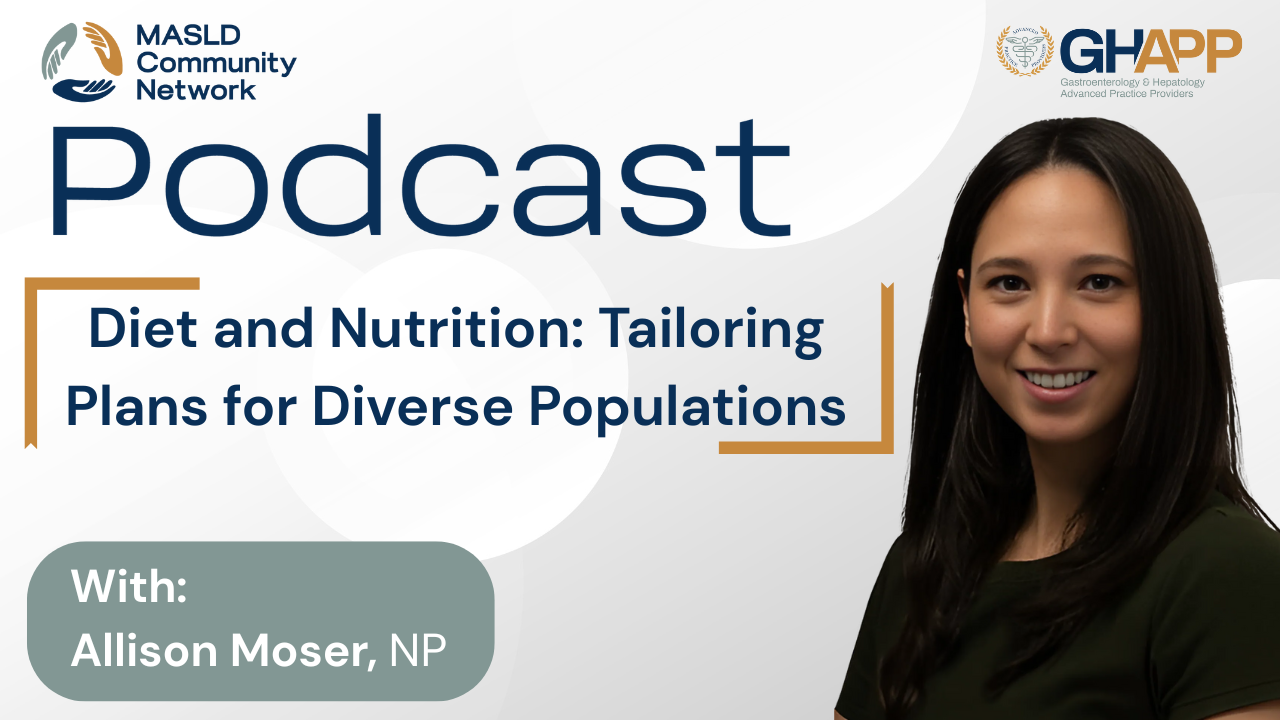
Diet and Nutrition: Tailoring Plans for Diverse Populations

In this episode, Allison Moser, NP, from Rush University Medical Center, dives into one of the most impactful aspects of MASH (Metabolic Dysfunction–Associated Steatohepatitis) management — diet and nutrition. While weight loss is often the starting point, Allison explains why sustainable liver health depends on personalized, culturally sensitive, and practical nutrition strategies. Learn how evidence-based eating patterns like the Mediterranean diet and plant-based diets can reduce hepatic steatosis, improve insulin sensitivity, and lower inflammation, even without weight loss. Allison shares actionable food swaps for diverse cultures, affordable ways to eat healthy when access is limited, and tailored recommendations for patients with comorbidities like diabetes, CKD, and cardiovascular disease. She also discusses the major role of added sugars, processed foods, and sugary or diet beverages in driving liver damage — and how to help patients make realistic, stepwise changes that last. Whether you’re an APP, NP, PA, or clinician treating patients with MASH or MASLD, this episode offers practical, evidence-based tools to improve nutrition counseling, build patient trust, and support long-term liver health.
Watch Now
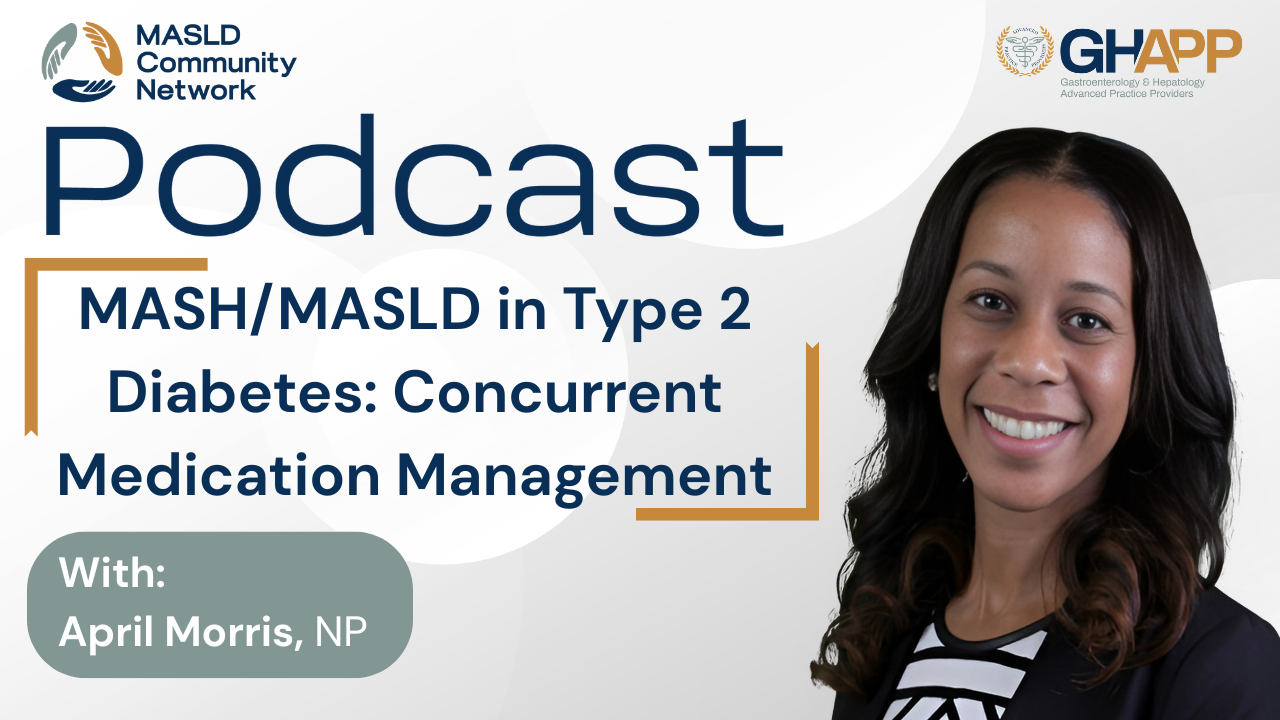
MASH/MASLD in Type 2 Diabetes: Concurrent Medication Management

In this video, April Morris, FNP, shares her expertise on the close connection between type 2 diabetes and fatty liver disease (MASLD/MASH). With over 16 years of experience in hepatology and endocrinology, she explains why patients with type 2 diabetes are at a higher risk of developing MASH due to shared risk factors like insulin resistance and obesity. April highlights how improving glycemic control, lowering A1C, weight loss, and lifestyle modifications can significantly reduce liver fat, inflammation, and fibrosis progression. She discusses the benefits of modern diabetes medications—including GLP-1 receptor agonists such as semaglutide and tirzepatide, SGLT2 inhibitors, and metformin—and how they not only improve blood sugar and weight management but also support liver, kidney, and heart health. Importantly, she notes that most diabetes medications remain safe for patients with liver disease unless advanced decompensated cirrhosis is present, where caution with metformin may be necessary due to lactic acidosis risk. April emphasizes that treating diabetes aggressively and reaching an A1C target around 7% can slow or even prevent progression of liver fibrosis. For APPs and providers, the takeaway is clear: effective diabetes management is one of the most powerful tools to improve liver outcomes.
Watch Now
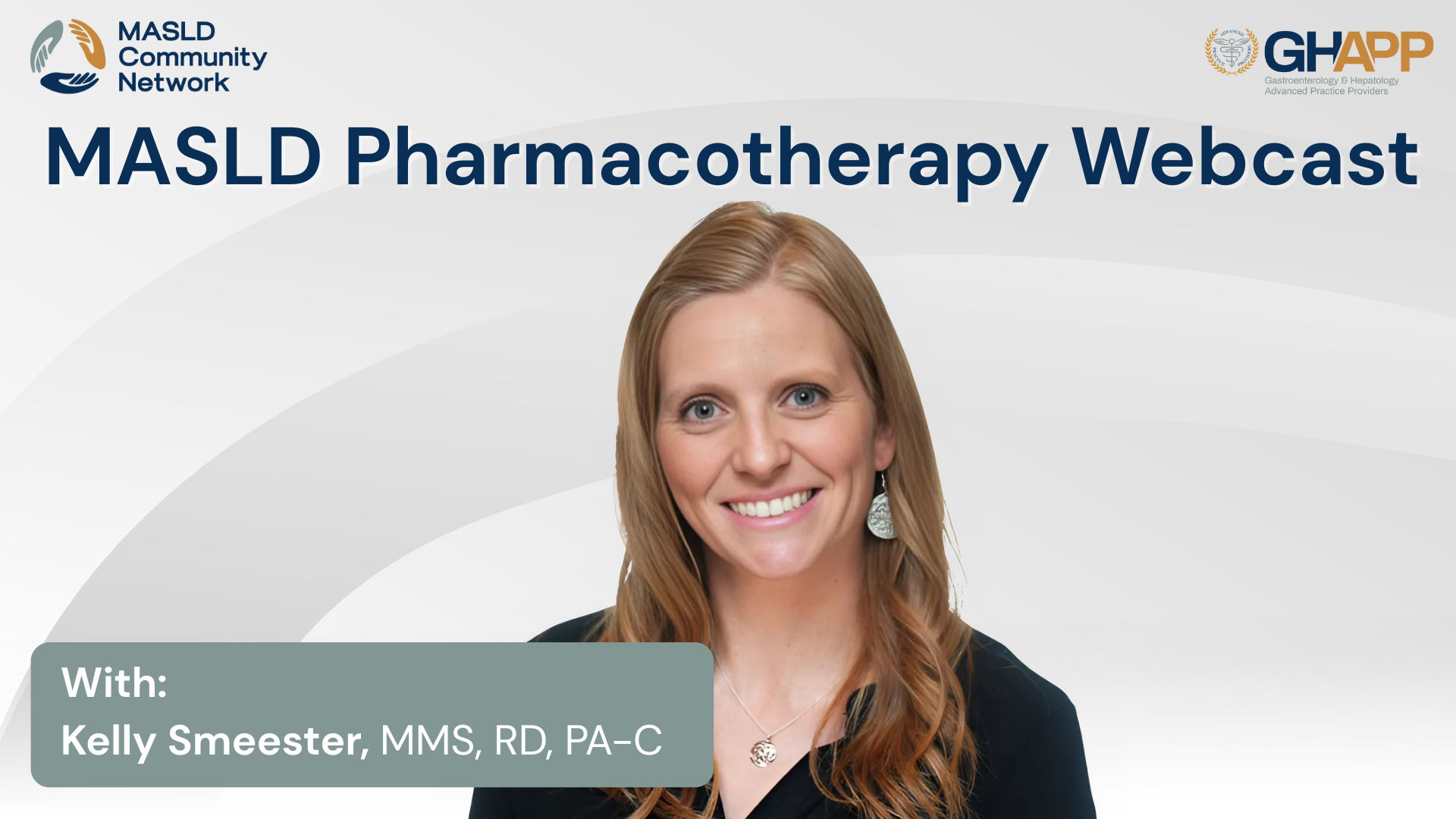
MASLD Pharmacotherapy With Kelly Smeester

Join Kelly Smeester, MMS, RD, PA-C, from South Denver Gastroenterology for an in-depth pharmacologic review of current and emerging treatment options for Metabolic Dysfunction-Associated Steatotic Liver Disease (MASLD) and MASH (Metabolic Dysfunction-Associated Steatohepatitis), as part of the GHAPP MASLD Community Network. This session outlines a comprehensive treatment strategy focused on three key goals: promoting weight loss, reducing cardiovascular risk, and targeting liver-specific interventions. Kelly highlights lifestyle and pharmacologic interventions including GLP-1 receptor agonists, GIP/GLP-1 dual agonists, and bariatric surgery, while exploring evidence-based guidance for treating comorbidities like type 2 diabetes, hypertension, and dyslipidemia. She dives into the latest data on vitamin E, pioglitazone, and the newly FDA-approved Resmetirom (Rezdiffra)—a thyroid hormone receptor beta agonist indicated for adults with non-cirrhotic NASH and F2–F3 fibrosis. Learn about the results from pivotal clinical trials like ESSENCE, PIVENS, and MAESTRO-NASH, the importance of NAFLD activity scoring, as well as dosing strategies, adverse effects, and drug interactions to consider when using Resmetirom. The session also explores practical monitoring approaches including FibroScan, MRI-PDFF, and ELF scores, with an outlook on evolving treatment duration and insurance coverage considerations. Whether you're a hepatology provider or part of a multidisciplinary care team, this presentation offers critical insights to optimize MASH treatment pathways today and in the future.
Watch Now

NITs: A Practical Overview: Navigating the Basics

In this episode, Christie Morrison breaks down the fundamentals of non-invasive testing (NITs) for evaluating patients with fatty liver disease, including MASLD and MASH. She explains the key differences between steatosis (MASLD) and steatohepatitis (MASH), highlighting how non-invasive tests can replace liver biopsy for staging fibrosis. Christy reviews common tools like FIB-4, NAFLD fibrosis score, Enhanced Liver Fibrosis (ELF) score, transient elastography (FibroScan), and MR elastography, and outlines how to choose the right test based on patient factors such as co-morbidities, geography, access to labs, and imaging availability. The episode also emphasizes the importance of fibrosis risk stratification, interpreting FIB-4 cutoffs, and monitoring liver stiffness or ELF scores after initiating lifestyle or pharmacologic treatment—including newer therapies like resmetirom. This is a must-watch for APPs, GI clinicians, and primary care providers seeking to improve care pathways and outcomes in patients with metabolic liver disease through practical, accessible strategies for fibrosis detection and management.
Watch Now
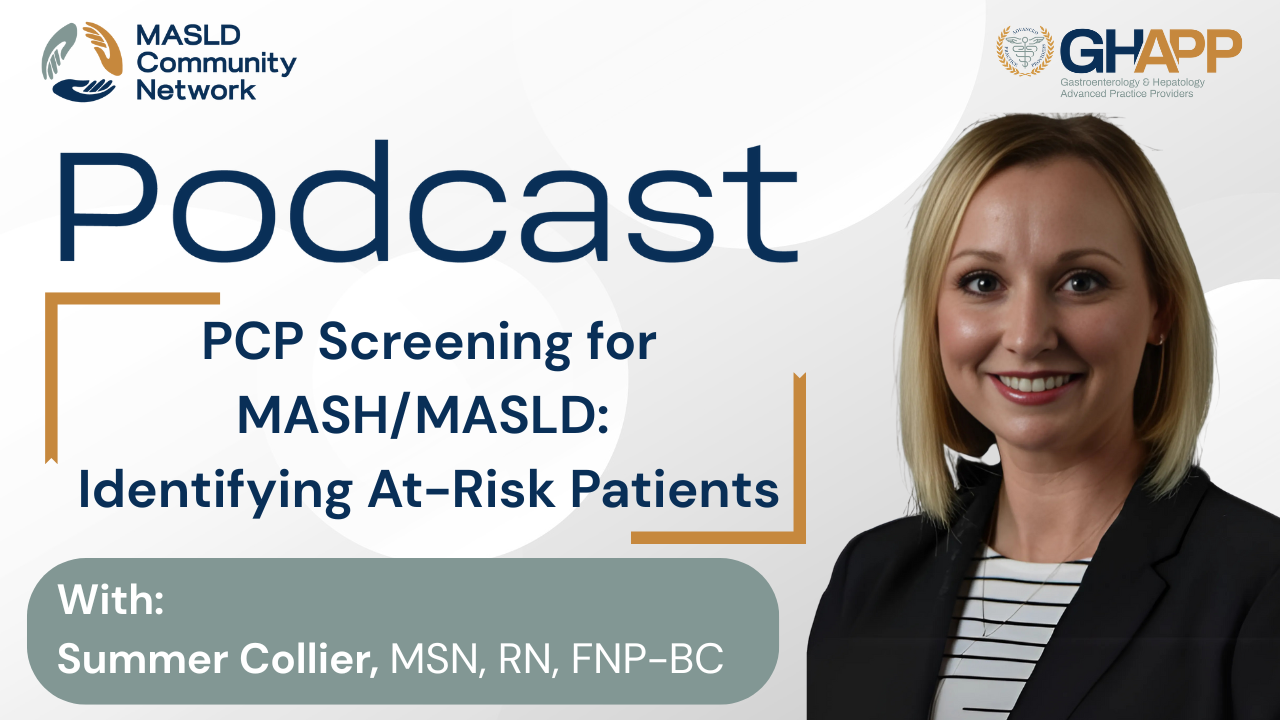
Podcast: PCP Screening for MASH/MASLD: Identifying At-Risk Patients

In this essential podcast episode from the GHAPP MASLD/MASH Community Network, Summer Collier, NP at UC San Diego Health, dives into the critical role that primary care providers and advanced practice providers play in recognizing and managing MASLD (Metabolic dysfunction-associated steatotic liver disease) and its progressive form, MASH (Metabolic-associated steatohepatitis). With MASLD affecting a growing number of patients—many undiagnosed—Summer walks through practical strategies for early identification, starting with high-risk individuals such as those with type 2 diabetes, obesity, or metabolic syndrome. She highlights the use of the FIB-4 index as a quick, validated, and guideline-recommended first-line screening tool, and explains how to interpret FIB-4 results to stratify risk and determine next steps, including ELF testing, FibroScan®, or referral to GI/hepatology. Summer also offers actionable workflow tips to integrate liver screening into routine primary care, like embedding FIB-4 calculators in EMRs or incorporating assessments into annual diabetes visits. This episode is a must-listen for clinicians seeking to prevent liver fibrosis progression and liver cancer through early, proactive care.
Watch Now
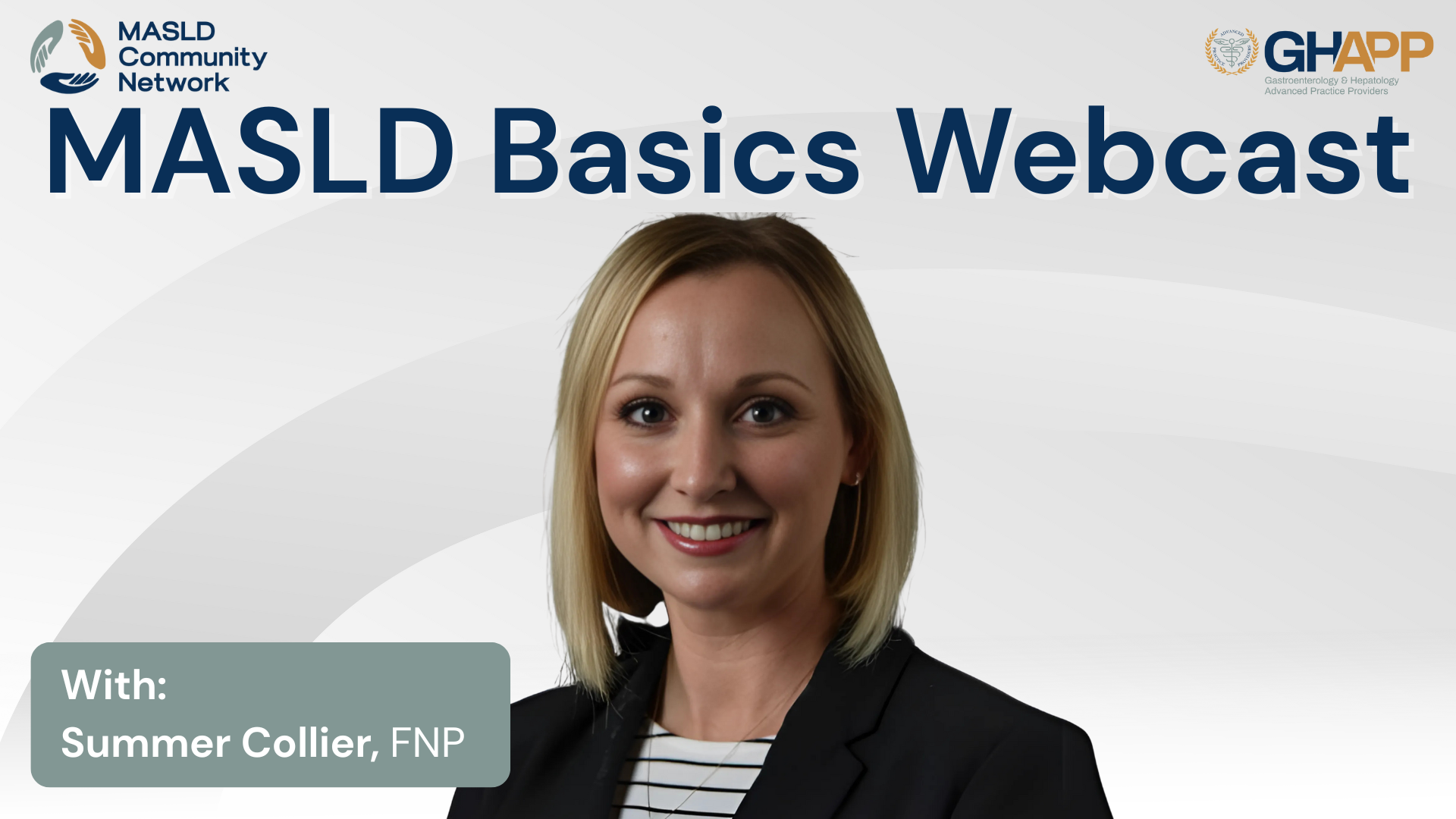
MASLD Basics With Summer Collier

Join Summer Collier, NP from UC San Diego Health, for an essential overview of MASLD (Metabolic Dysfunction-Associated Steatotic Liver Disease) in this GHAPP MASLD Community Network session. Designed for clinicians and healthcare professionals, this case-based talk covers the evolving nomenclature shift from NAFLD/NASH to MASLD/MASH, including key definitions, diagnostic criteria, and practical tools for identifying and managing patients with steatotic liver disease. Summer walks through foundational concepts like the role of hepatic steatosis, cardio-metabolic risk factors, and the importance of excluding significant alcohol use to establish a MASLD diagnosis. She also provides clinical insights into non-invasive fibrosis staging using FIB-4, FibroScan, elastography, and blood-based tests, as well as how to differentiate patients who may require hepatology referral or biopsy. Emphasizing the importance of early detection and risk stratification in primary care, this session highlights how fibrosis stage impacts prognosis, treatment planning, and long-term liver-related outcomes. For more educational sessions and MASLD tools — visit the GHAPP MASLD Community Network.
Watch Now
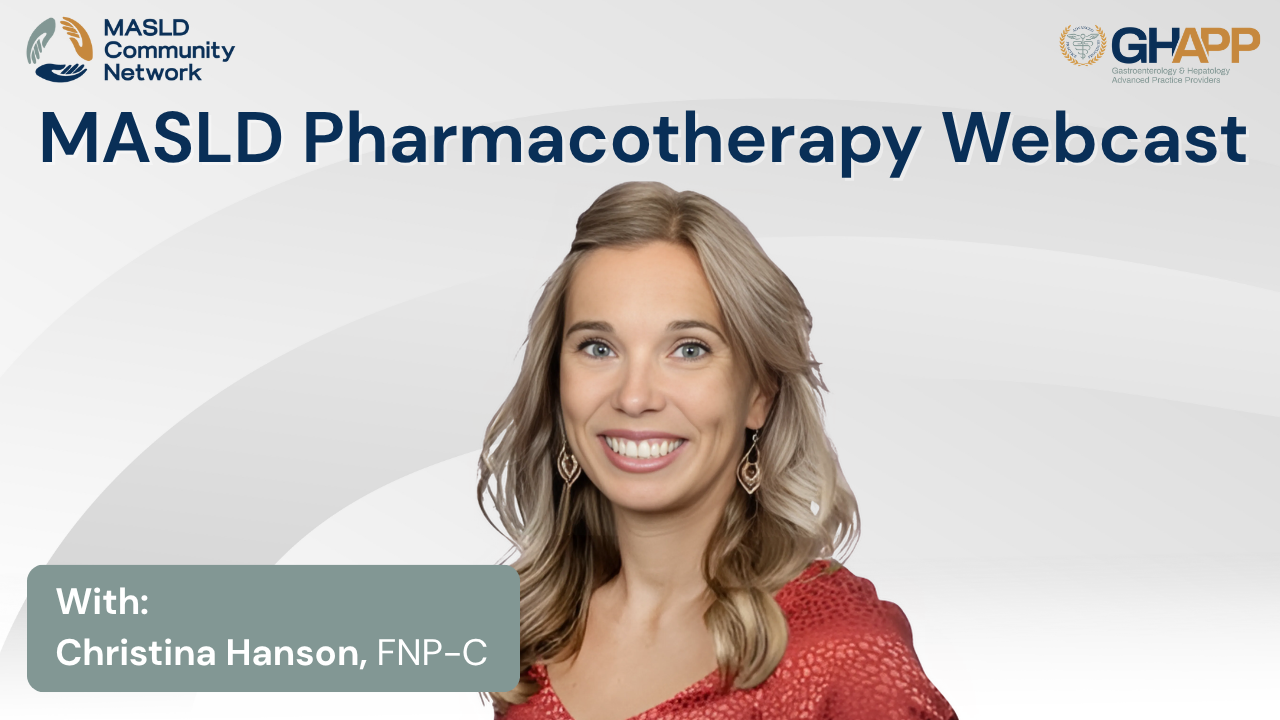
MASLD Pharmacotherapy With Christina Hanson

Learn about the latest advances in MASLD and MASH pharmacotherapy in this educational session from the GHAPP MASLD Community Network. Christina Hanson, NP, reviews the evolving landscape of treatment for metabolic dysfunction-associated steatotic liver disease (MASLD) and steatohepatitis (MASH), including the critical role of weight loss, cardiovascular risk reduction, and liver-directed therapies. The discussion covers current management strategies such as GLP-1 receptor agonists, bariatric interventions, statins, and lifestyle modification, while also exploring guideline-supported options like vitamin E and pioglitazone. Special attention is given to the first FDA-approved therapy for MASH, Resmetirom, including its mechanism, clinical trial results, safety considerations, and monitoring recommendations. Whether you are a hepatology specialist, primary care provider, endocrinologist, or advanced practice provider, this session highlights practical approaches to managing patients with MASLD and MASH and offers insights into emerging therapies that may shape future clinical practice.
Watch Now
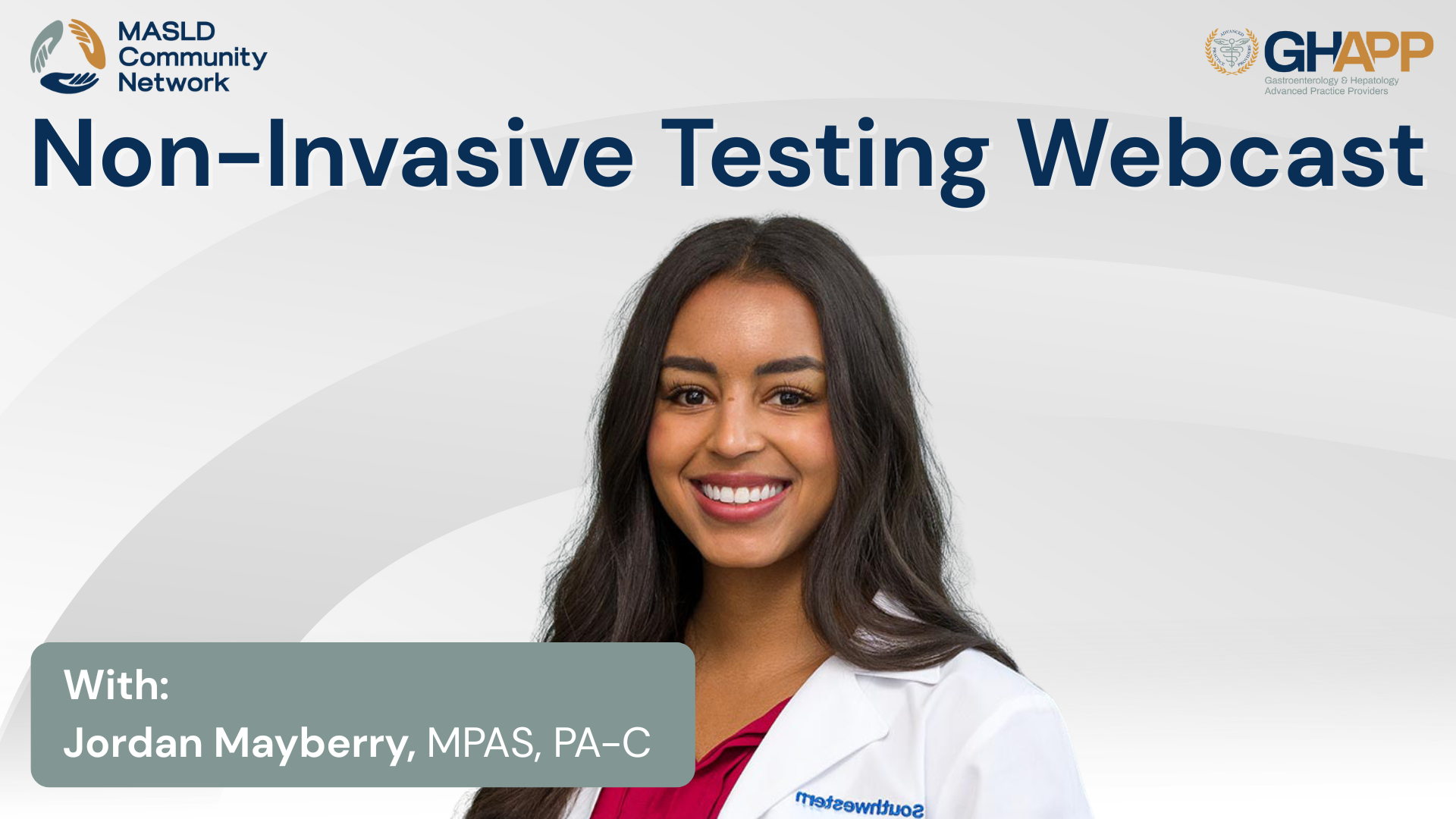
Non-Invasive Testing With Jordan Mayberry

In this educational session, Jordan Mayberry, PA-C from UT Southwestern, presents a practical overview of non-invasive testing for diagnosing and staging metabolic dysfunction-associated steatotic liver disease (MASLD) and metabolic-associated steatohepatitis (MASH). Using a real-world patient case, Jordan discusses how clinicians can leverage key tools—such as FIB-4, ELF testing, FibroScan (VCTE), and MRI elastography—to assess fibrosis and stratify risk in patients with MASLD. She explains the benefits, limitations, and clinical applications of each modality, including guidance on when and how to use them in everyday practice. Whether you're a hepatology specialist or a provider managing patients with cardiometabolic risk factors, this talk delivers a clear, step-by-step approach to incorporating non-invasive liver assessment into your workflow. Viewers are also invited to explore the GHAPP MASLD/MASH Community Network for ongoing education, resources, and clinical insights.
Watch Now
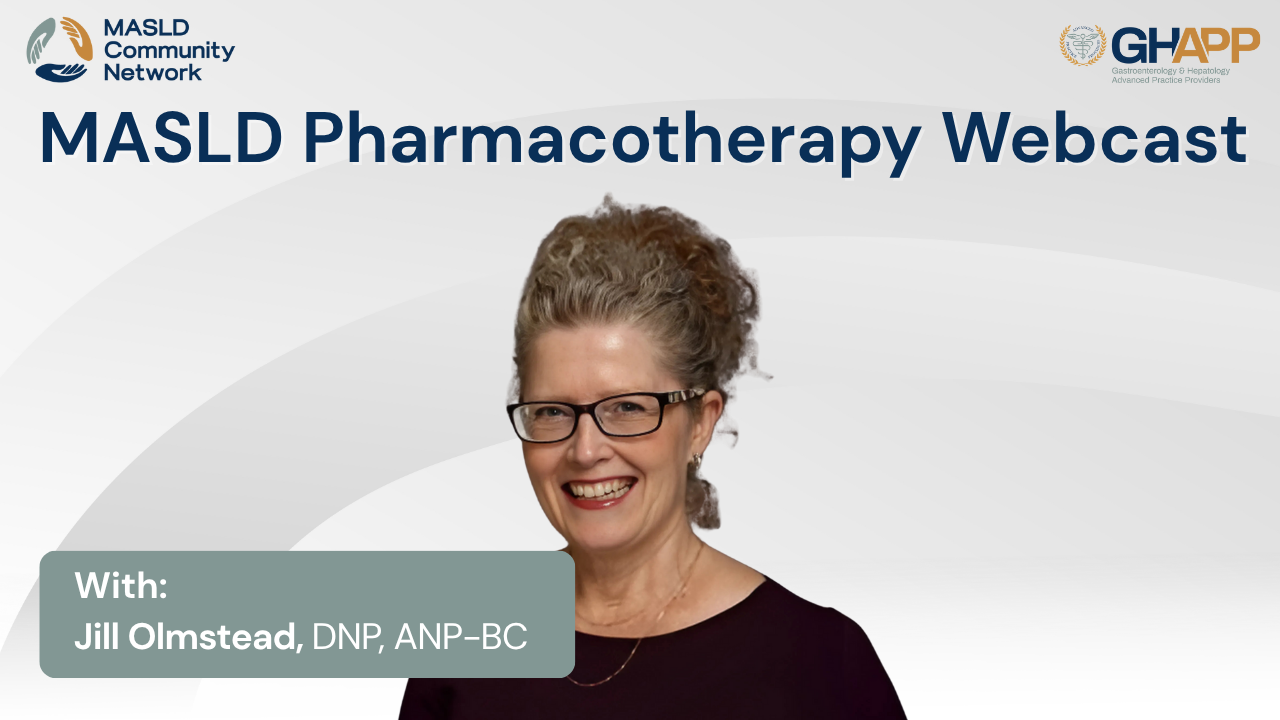
MASLD Pharmacotherapy With Jill Olmstead

Join Jill Olmstead, DNP from Providence Health for a practical, clinician-focused overview of MASLD pharmacotherapy and new treatment horizons for hepatic steatosis. This session in the GHAPP MASLD & MASH Community Network covers the shift in nomenclature, why care must be multidisciplinary (obesity, type 2 diabetes, dyslipidemia, hypertension, cardiovascular risk), and how to stage disease with FIB-4, noninvasive tests, and FibroScan before initiating therapy. Jill reviews lifestyle and weight-loss strategies, GLP-1 receptor agonists—their mechanisms, common GI side effects, and peri-procedure considerations due to delayed gastric emptying—plus where vitamin E and pioglitazone do and don’t fit today. She also walks through practical use of resmetirom for non-cirrhotic MASH with F2–F3 fibrosis (labs to order, monitoring, drug–drug interactions, and setting expectations alongside diet and exercise). If you’re a GI/hepatology clinician, APP, or primary-care partner looking to streamline risk reduction, staging, and evidence-based therapy for MASLD/MASH, this talk delivers step-by-step guidance you can use in clinic today.
Watch Now
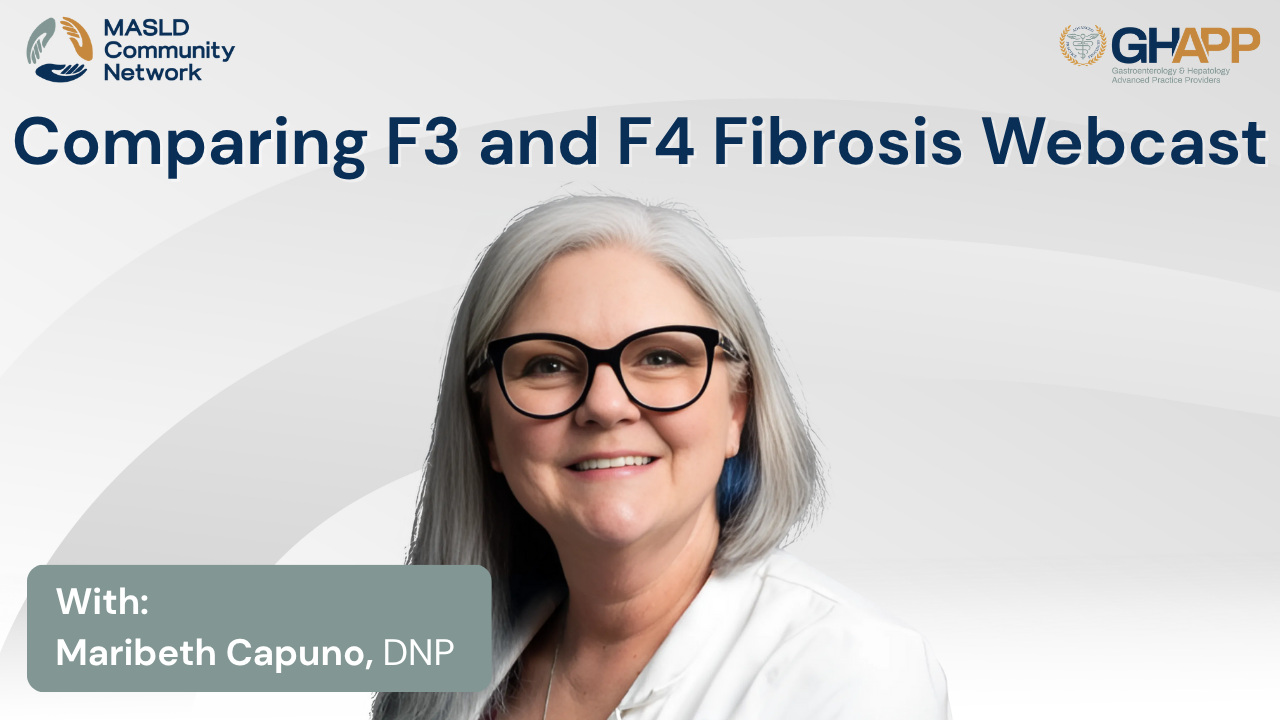
Comparing F3 and F4 Fibrosis With Maribeth Capuno

Join Maribeth Capuno, DNP, from the Richmond VA Medical Center, for an insightful case-based discussion on F3 vs. F4 fibrosis staging in patients with Metabolic Dysfunction-Associated Steatotic Liver Disease (MASLD) and MASH, presented through the GHAPP MASLD/MASH Community Network and sponsored by Madrigal Pharmaceuticals. Using the fictional case of “Sam,” Maribeth demonstrates how to differentiate between F3 and F4 fibrosis using non-invasive tools like FIB-4, FibroScan, and the ELF test, while explaining their respective cutoffs and clinical implications. Learn how to stage MASLD accurately, when to consider MRI elastography or liver biopsy, and how to initiate evidence-based management strategies including lifestyle modification, GLP-1 therapy, and the newly approved medication Resmetirom (Rezdiffra). The session highlights the importance of HCC surveillance, portal hypertension screening, and the nuances in monitoring between F3 and F4 fibrosis stages. With a strong emphasis on practical, guideline-aligned hepatology care, this video provides essential insights for clinicians managing the growing MASLD population.
Watch Now





 June 2025
June 2025 